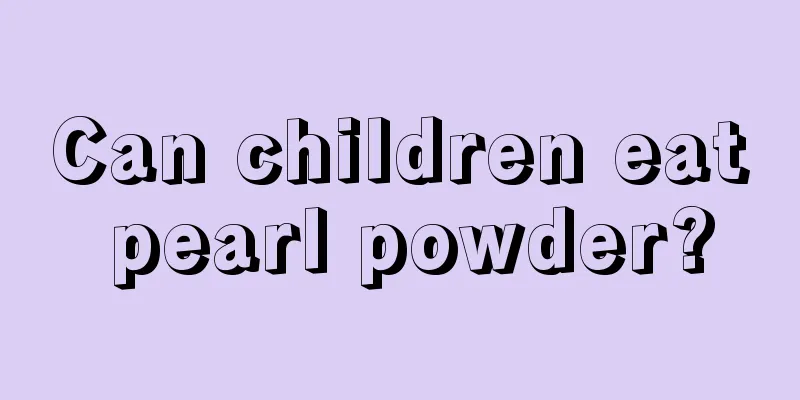Why does the baby's neck sweat when sleeping?

|
Every parent hopes that their baby can grow up healthily. However, since many parents lack experience in taking care of their babies, they do not know the reasons when encountering certain situations, and thus always blindly give their babies medicines and supplements. In fact, this approach is very incorrect. After all, all medicines are three-point poisons. Many parents have encountered babies sweating on their necks while sleeping, which makes parents particularly worried. Let's understand why babies sweat on their necks while sleeping. Why does the baby's neck sweat when sleeping? Infants and young children have an active metabolism and are active and lively. Some of them cannot rest even after going to bed at night, so they may sweat on their heads after falling asleep. The so-called physiological hyperhidrosis refers to sweating during sleep when the child is well-developed, healthy, and has no disease. Parents are often accustomed to deciding the best environmental temperature for their children based on their own subjective feelings, and like to cover their babies with more blankets and keep them tightly covered. Because children's brain and nervous system are not yet fully developed and they are in the growth and development period, their body metabolism is very active. Coupled with the stimulation of overheating, they can only regulate normal body temperature by sweating to evaporate the heat in the body. In addition, drinking milk, malted milk or eating chocolate before going to bed can also cause sweating in children. Some parents give their children milk, malted milk, etc. before they go to sleep. After the child falls asleep, the body produces a large amount of heat, which is mainly dissipated through sweating through the skin. In addition, too high room temperature or excessive warmth can also cause children to sweat while sleeping, which are all physiological sweating. Pathological sweating occurs when the child is in a quiet state, such as sweating caused by rickets, which manifests as obvious sweating on the child's head in the first half of the night after falling asleep. Because the pillow is irritated by sweat, babies often shake their heads and rub against the pillow when they sleep, resulting in sparse hair and loss of hair on the pillow, forming typical annular hair loss on the pillow, which is medically known as "occipital baldness". It is an early manifestation of rickets in infants. As long as vitamin D and calcium are supplemented in time, rickets can be controlled and sweating will stop by itself. If a child sweats not only in the first half of the night but also in the second half of the night and before dawn, it is usually a sign of illness, the most common of which is tuberculosis. Tuberculosis also has other symptoms, such as low fever, fatigue, loss of appetite, flushed cheeks, etc. Children with tuberculosis tend to sweat easily during daytime activities, which is called spontaneous sweating, and sweating at night is called night sweats. If you suspect your child is infected with tuberculosis, a lung X-ray or a tuberculin test should be done for timely diagnosis and treatment. Heart disease, diabetes (hypoglycemia), tuberculosis or breathing problems during sleep, because the internal pressure (lesions) of the body causes the sympathetic nerves to be in a state of tension all the time, may also cause "night sweats" or "cold sweats on hands and feet". This is a long-term symptom. If parents are worried, they can take the baby to a pediatric clinic or hospital for examination, listen to the heartbeat for abnormalities, feel the belly for lumps (tumors), check whether the upper respiratory tract is unobstructed or whether the baby has allergies, etc., to eliminate doubts in their hearts. Clinical observations show that children with night sweats often suffer from internal heat. One reason is heat accumulation in the spleen and stomach, and the other is internal heat due to yin deficiency. The heat forces body fluids out, so the night sweats continue. If the heat is not cleared, the sweating cannot be stopped. To eliminate night sweats, you must clear the heat. Children with heat accumulation in the spleen and stomach may have a brisk or reduced appetite, good spirits, constipation, and frequent bowel movements. Although they are thin, they do not feel tired and they play all day long. The principle of treatment is to clear away heat and promote bowel movements to expel the heat. The most common type is Yin deficiency and internal heat. Due to long-term night sweats, the body fluid is consumed excessively, resulting in a Yin deficiency phenomenon. The children have red and dry lips and tongue, hot hands and feet, dry mouth, and bowel movements every few days with dry and granular feces. The treatment should be to clear away heat and nourish yin so that the heat can be eliminated internally and the sweat can be eliminated quickly. Children with night sweats are often prone to catching colds, and very few of them are truly physically weak. Most of them kick off their quilts in their dreams due to sweating and catch colds, which should be distinguished from colds caused by physical weakness. Among children with night sweats, some do not suffer from internal heat accumulation. They sweat a lot, are prone to colds and coughs, and are afraid of colds. They also sweat easily after a little exercise. For such children, it is not advisable to blindly use supplements during treatment, but to harmonize the spleen and stomach. Children with weak constitutions often sweat in patches on their head, chest, and back when they are active during the day or after falling asleep at night. It is often caused by malnutrition due to improper feeding or poor digestion and absorption. In terms of nursing, attention should be paid to adjusting feeding methods, promoting children's appetite, and increasing the intake of protein, fat and sugar. If necessary, traditional Chinese medicine can be used to regulate spleen and stomach disharmony. Therefore, children's sweating during sleep should be carefully distinguished. If necessary, take the child to the hospital to check trace elements and treat any abnormalities in time. The above is an introduction to why the baby's neck sweats when sleeping. After understanding it, we know that there are many reasons for this phenomenon. First of all, when encountering such symptoms, parents should not worry too much. They must understand the reasons and then make adjustments. In addition, do not dress the baby in too many clothes. Be sure to wear some cotton clothes with good breathability. If you cannot understand the reasons, you can take the baby to the hospital for examination. |
<<: What are the baby growth indicators?
>>: Reasons for frequent urination in two-year-old babies
Recommend
Six-month baby development indicators
We all know that many babies are in unhealthy con...
What to do if the baby is breathing loudly
There are many reasons that can cause babies to h...
The harm of fluoride coating on children's teeth
There are many benefits of fluoride coating on ch...
What are the symptoms of roundworms in children?
Every parent hopes that their children can grow u...
What's wrong with the red spots on the child?
Children are very susceptible to diseases when th...
Measures for children with stomachache and fever and post-diagnosis care
Children have weak constitutions, so if they acci...
What are the scientific considerations for shaving baby hair?
Now a large number of second children are being b...
What is the massage method for children with cold and cough?
Children are more likely to catch a cold because ...
What's the matter with blood in baby's stool?
If there is blood in the baby's stool, it may...
What should children eat if they are zinc deficient?
Zinc deficiency is a common problem in children. ...
What are the harms of carrying a backpack on the right shoulder for a long time?
Backpacks are a must-have item in our daily life,...
What to do if your baby gets stuck while eating an apple
Apples contain a lot of nutrients. Whether it is ...
Children's vision loss
We all know that a baby's declining eyesight ...
How many deciduous teeth should be replaced?
Everyone must have experienced tooth replacement....
Can children with urticaria take a bath?
Children are more likely to get urticaria than ot...









